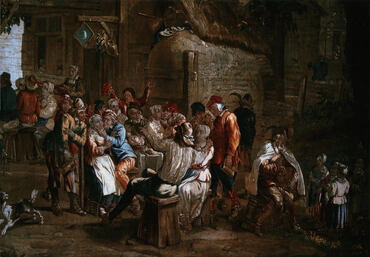Festa

Há dois tipos de banquetes mencionados na Bíblia. Algumas foram realizadas para comemorar eventos específicos e únicos, como a festa que Abraão realizou para celebrar o nascimento de Isaque. Outros são comandados pelo povo de Israel como eventos anuais ou repetidos.
Em geral, as festas únicas representam uma conjunção de dois estados espirituais. Somos chamados, por exemplo, a trazer nossas vidas externas - o que fazemos e pensamos no dia-a-dia - em conjunção com as crenças internas que temos no Senhor e seus desejos de bem para nós. Nos momentos em que conseguimos fazer isso, podemos experimentar uma sensação de alegria e plenitude que nos traz à mente uma festa.
As festas prescritas representam a alegria que podemos sentir na adoração ao Senhor - tanto em atos rituais de adoração quanto na adoração que oferecemos quando vivemos de acordo com Seus mandamentos.
Estes são significados adequados, tanto porque as festas são alegres e festivas como também devido ao significado espiritual do alimento e da bebida. O alimento representa o desejo de bem, que em última análise nos vem do Senhor. A bebida representa as verdadeiras idéias que nos ajudam a saber o que é bom e como agir sobre ela. Festejar implica adquirir grandes quantidades de ambos, o que é certamente uma coisa alegre.
(Odkazy: Arcanos Celestes 2341, 3832, 5161, 7093 [1-5], 7884, 9286, 9296, 10412)
Arcana Coelestia # 9286
9286. 'Three times you shall keep a feast to Me in the year' means enduring worship of the Lord and thanksgiving on account of deliverance from damnation. This is clear from the meaning of 'keeping a feast' or 'holding a feast' as worshipping the Lord with gladness of mind on account of deliverance from damnation, dealt with in 7093; and from the meaning of 'three times in the year' as a state complete right to its end, for 'three' means complete from the beginning to the end, 2788, 4495, 7715, 9198, and 'year' a whole period, 2906, 7839, 8070. At this point therefore complete and whole deliverance is meant; for 'the feast of unleavened bread' means purification from falsities, 'the feast of harvest' means the planting of truth in good, and 'the feast of ingathering' means the implanting of good from there. Thus complete deliverance from damnation is meant by these feasts; for when a person has been purified from falsities, and after this has been brought by means of truths into good, and is at length governed by good, he is in heaven with the Lord and has accordingly undergone complete deliverance.
[2] The consecutive stages of deliverance from damnation are like the consecutive stages of regeneration; for regeneration is deliverance by the Lord from hell and being led by Him into heaven. For a person who is being regenerated is first purified from falsities, after that the truths of faith he knows are planted in the good of charity, and finally that good itself is implanted in him. When all this has been done the person has been regenerated and he is then in heaven with the Lord. Therefore the three feasts in the year also meant worship of the Lord and thanksgiving on account of regeneration. Because these feasts were established on account of the everlasting remembrance of those things, the worship and thanksgiving are called enduring; for the most important things in worship should endure forever. The things which should endure forever are those which have been inscribed not only on the memory but also on the actual life that is led. When this is so they are said to reign universally with a person, see 5949, 6159, 6571, 8853-8858, 8865.






